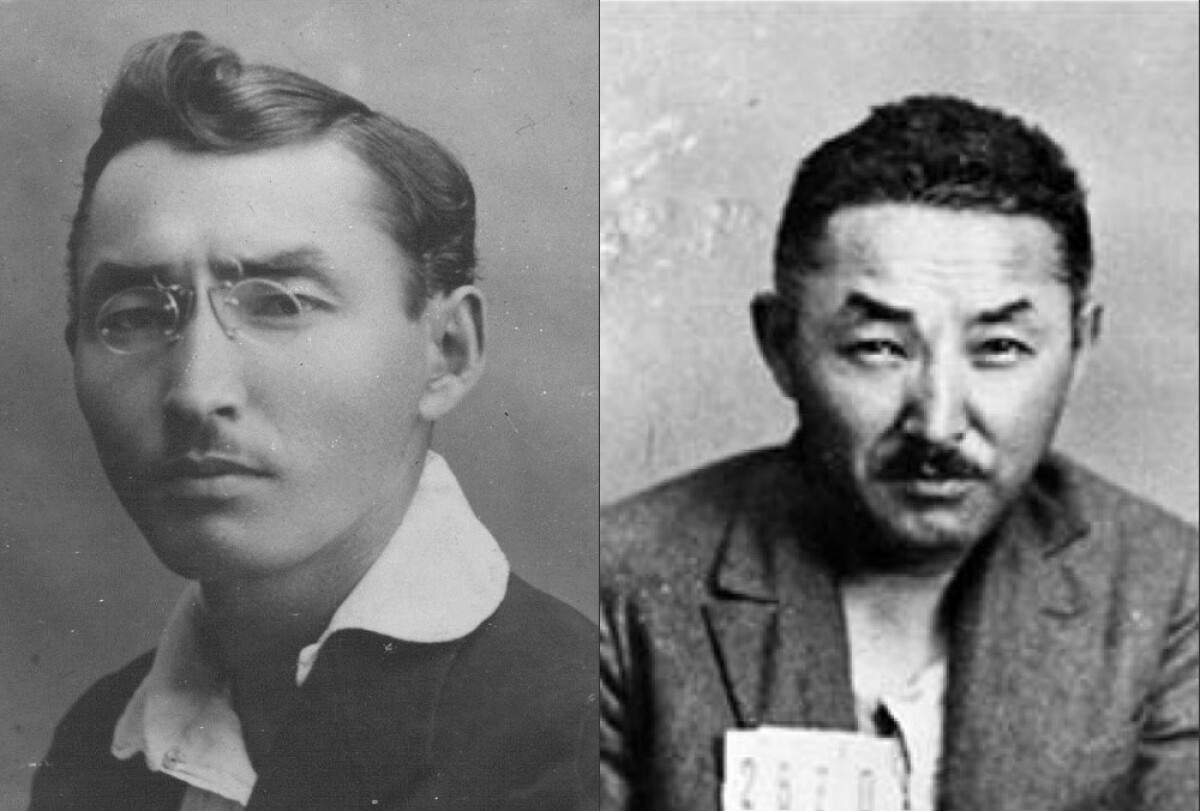
Zhusupbek Aymautov — the man with generous talent, esthetic and artistic views of whom were created in the most difficult years «storm and impact», public activity and opposition — two revolutions, national and patriotic movement «Alash», hot discussions about the future of the Steppe. Reflection of the rough changes happened in society, demolition of the old world and revival of the new, could not affect subject, a genre originally and language of the talented writer.
The writer, the poet, the translator, the scientist-teacher Zhusupbek Aymautov made a big contribution to the spiritual potential of the nation. He submitted surrounding with boundless talent, owned not only the word, but also was the remarkable actor, the director and the composer.
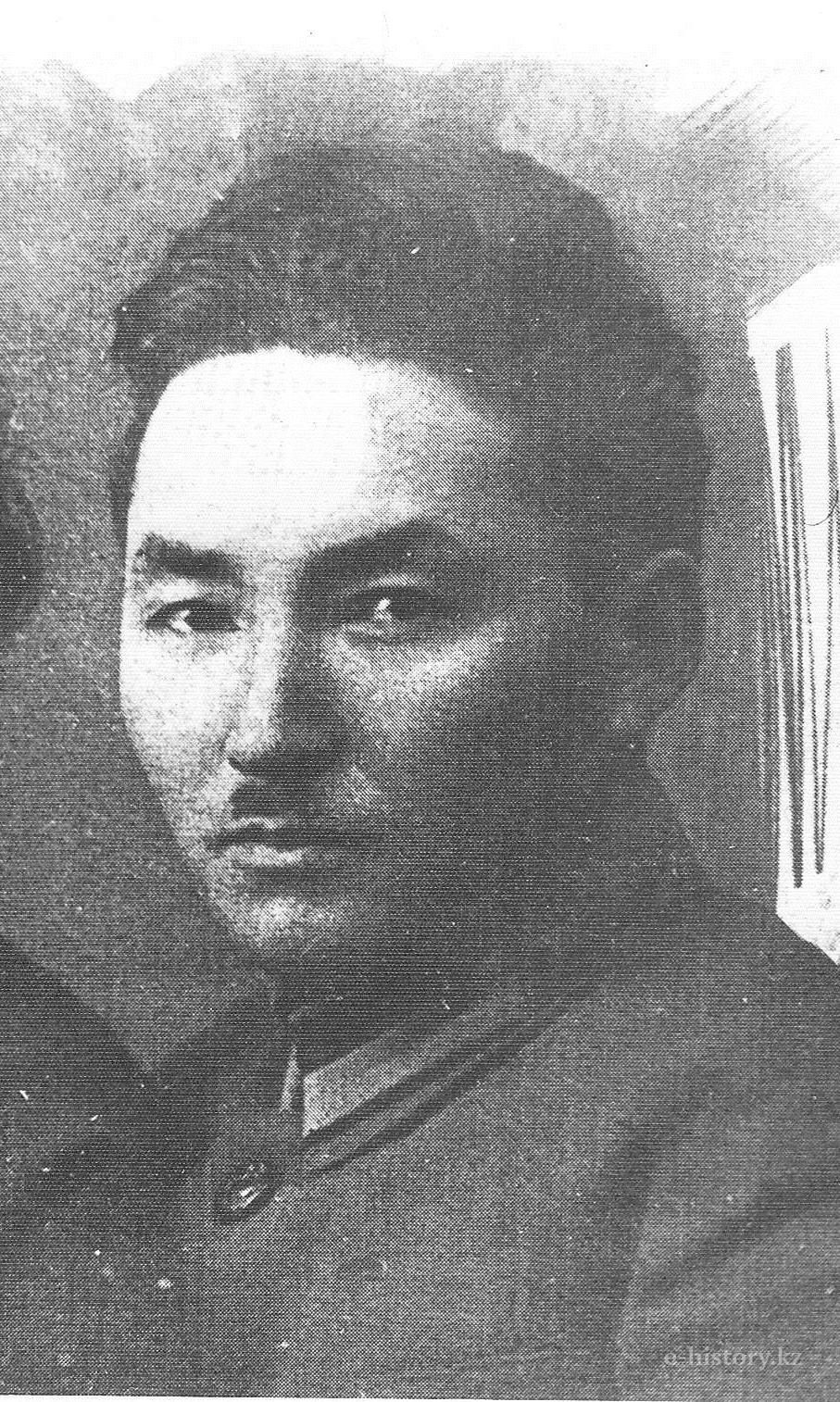
Zhusupbek Aymautov was born in 1889 in the village Kyzyltau of the Pavlodar district of the Semipalatinsk province (nowadays the village of Zhusupbek Aymautov). "He was born in the village Dandibay in the area "Karanyn adyry" at the foot of the mountain Kyzyltau. From the suyndik tribe, further kulik, relatives with Sultanmakhmut in the eight generation" — wrote Zh. Aymautov.
Future writer in the childhood mastered the Arab literacy. Contrary to parents’ will, who did not wish to release to far their son. He went to Pavlodar where he entered to the Russian-Kazakh school. Then, in 1918 he successfully graduated Semipalatinsk teacher’s seminary. Being seminarist, together with A. Baytursynov, M. Dulatov and other figures of the national intellectuals took active part in work of the party "Alash Orda".
Zh. Aymautov enthusiastically met February revolution of 1917, hoping that he will bring freedom, equality and happiness to the people. Problems of equality of women, moral, fight against remnants of the past, education of younger generation on ideals of good and humanity became the principal subject lines in Aymautov’s works. Children of the repressed writer were scattered in different places. The eldest son Bektur suffered a lot. After arrest of his father he was arrested as «the son of the enemy of the people» and was sent to Siberian camp for 10 years.
Only few years later at the age of 78, Bektur returned home. It vividly recalled the city of the childhood: "… earlier Pavlodar was small. From one end of the city to another we reached on foot. Often I and my father went on walks, having transported on the ferry through Irtysh. Everything changed. The city became big. My childhood flickers before eyes. The native earth, a place of the childhood I always kept in my mind".
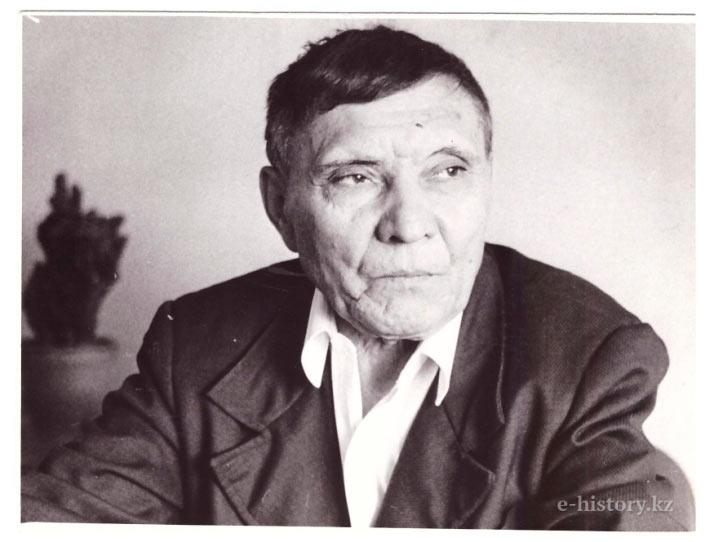
Aymautov’s second son Zhanak was born in February 18, 1920 in Semey. In 1941 as «the son of the enemy of the people» he was sent to Labor Army. He suffered of constant fear of prosecution and difficulties of daily life after war. Having graduated the Aktyubinks Institute of Teachers, he continued the education at physical and mathematical faculty of Kazakh State University named after Al-Farabi. "My father — the real person, the citizen and the public figure. I am proud of that he was the talented writer, the example for teacher, poet and translator" — wrote Zhanak Bekturov.
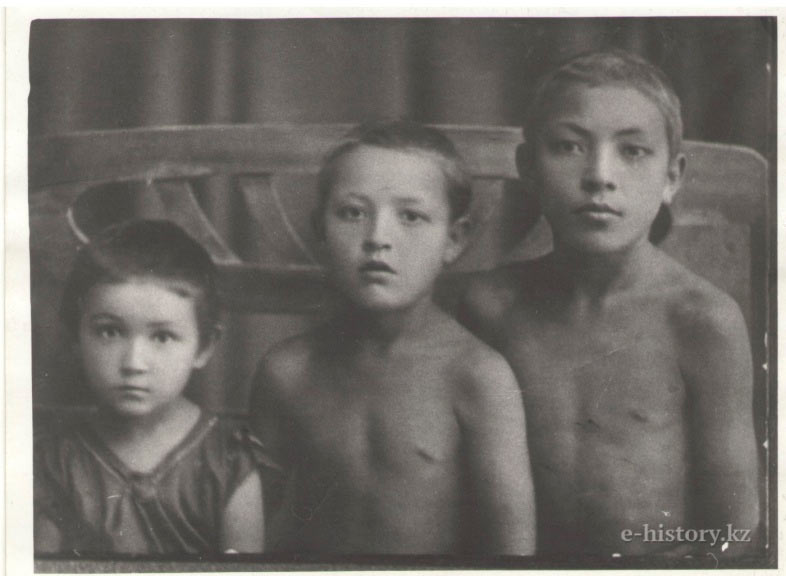
The writer’s daughter Muza (Marua, Magripa) was born in Orenburg on May 3, 1926. She was only four years old when the father was repressed. "From my mother I knew that the father was extraordinary talented person. Such impressions remained in memory: the father sits at the desktop, works, at the desktop a lamp with the green lamp shade" — told Muza.
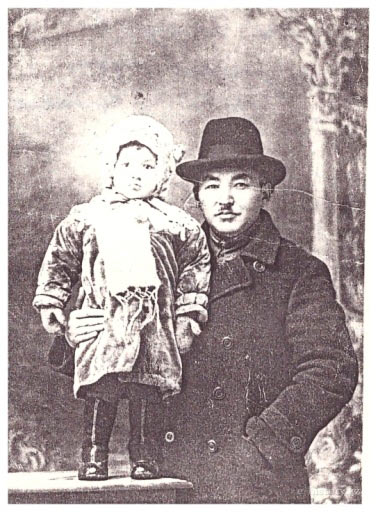
Zhusupbek Aymautov’s spouse Eugenia sacredly stored memory of the husband, preserved all family photos and his personal belongings. In the arrival to Pavlodar, in 1991 she donated all these invaluable relics to the museum of literature and art named after Bukhar Zhyrau.
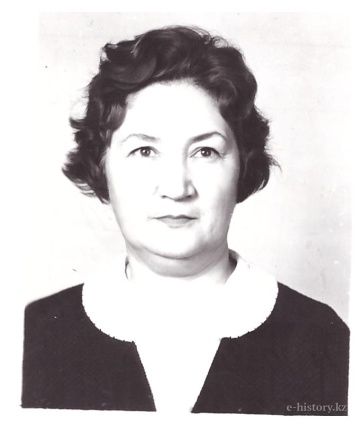
Among the invaluable things of the writer which are remained in the museum of Bukhar Zhyrau, the particular interest is caused by the pocket watch "Nakhikhat". Muza Aymautova told: "According to memories of my mother, the father never left with these watch. He could spend whole days and nights in his work. He had a habit frequently to look at the watch as he felt that he had little time left…"
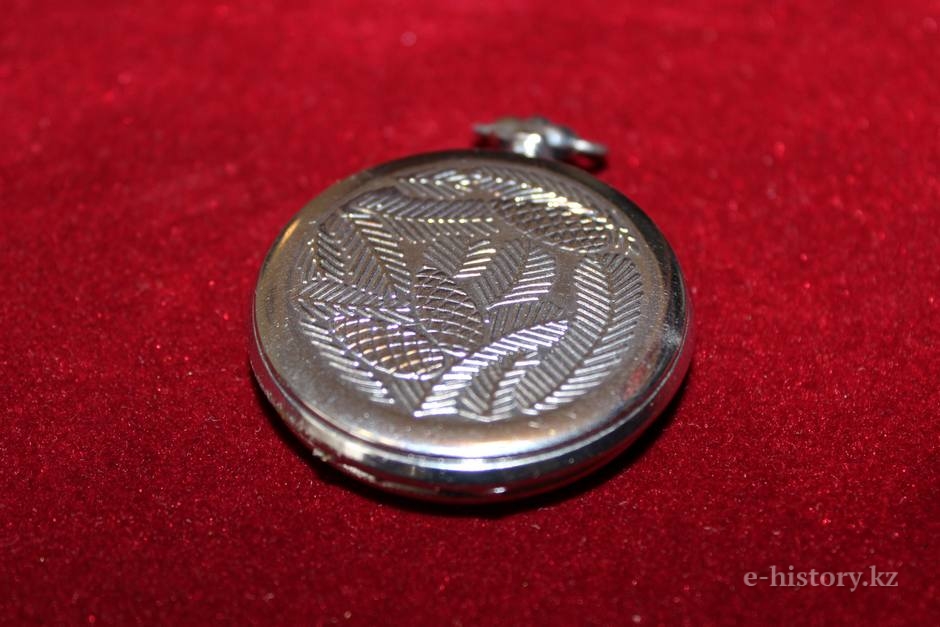
"Two rulers for cutting the paper were laid on his desktop». Father was very skillful person. These rulers were done by him. One of ruler’s form reminds a saber, on the handhold was represented the singing bird among plants. It symbolizes power and peacefulness of Kazakhs".
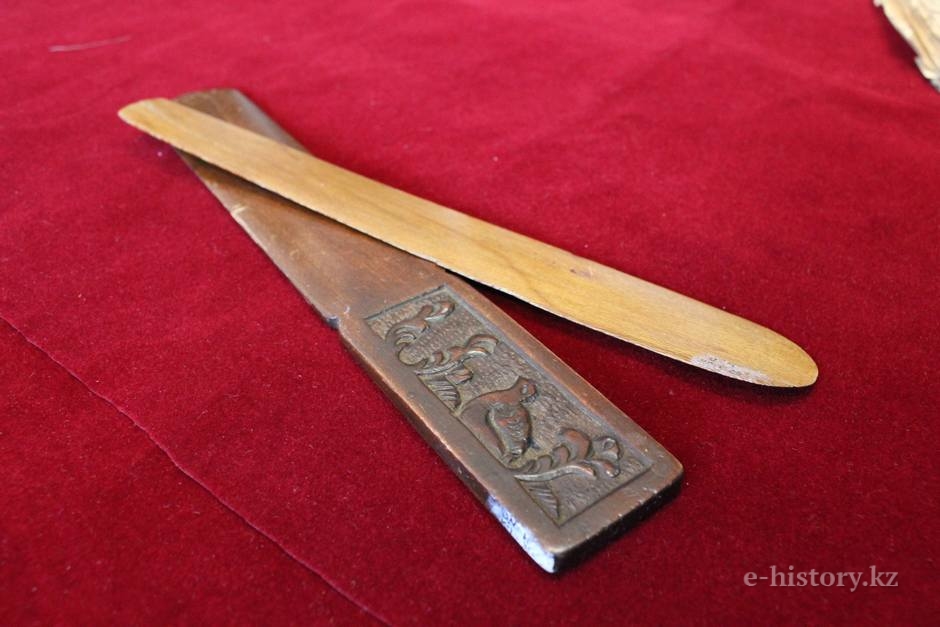
"The blotter for blotting the ink is one of the valuable things among other to me and I pass it to your museum. Based on my mother’s memories, father used to shook it back and forth while being in deep thoughts. This item was made by my father. Let’s look on the images on it. Here we can see the bird raising the baby bird. In each product made by my father we see the deepest philosophy of the Kazakh people".
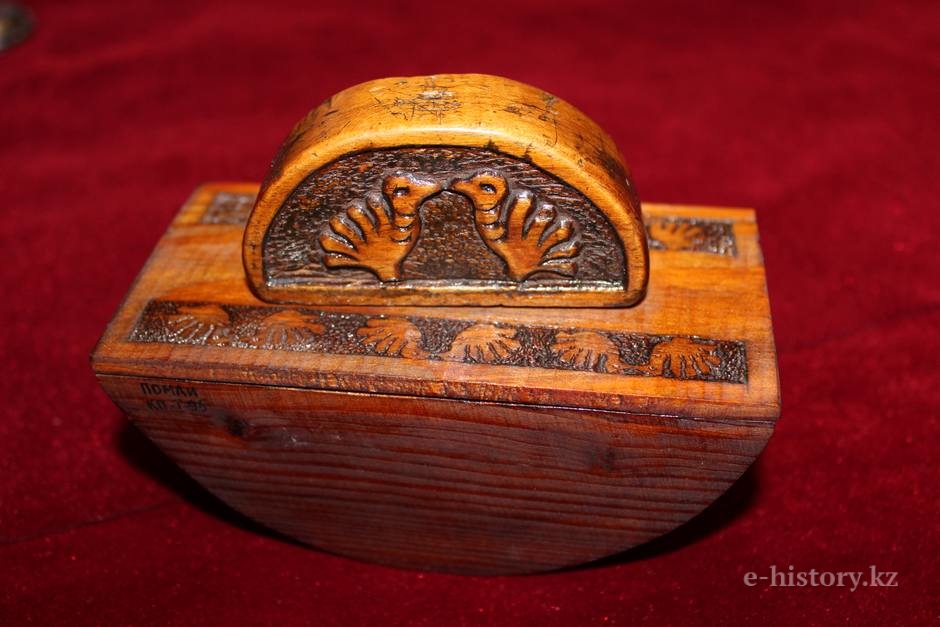
This carpet «Suzane» always hung at a headboard of parent’s bed. It was the work of Bukhara masters and was specially brought from Bukhara.
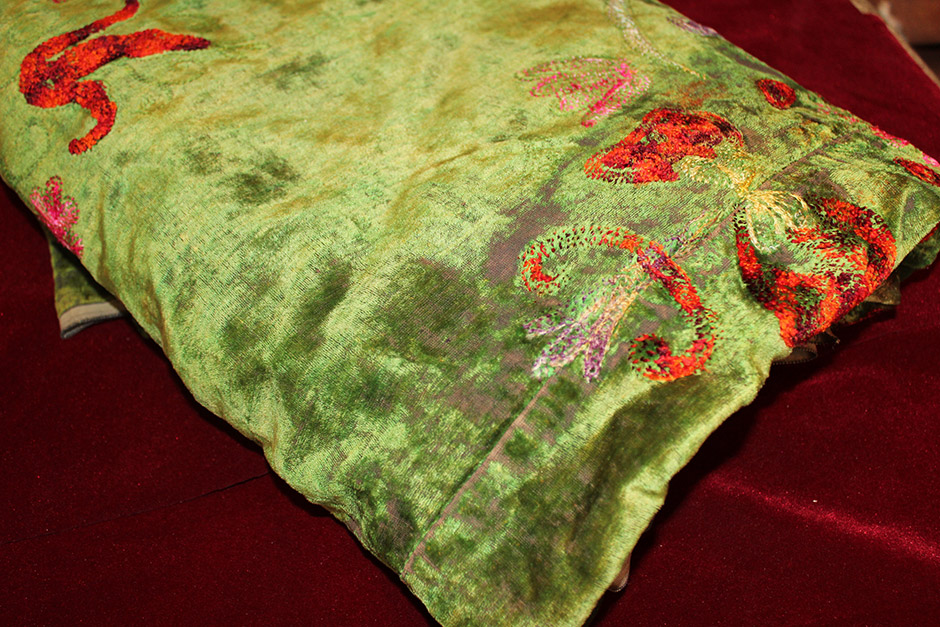
The feeling of compassion inherent in the intellectuals of that period was characteristic of Zh. Aymautov. It forced him to take part in the years of great hunger in creation of Semipalatinsk fund «Zhanar» which purpose was support to the population dying of hunger. Alikhan Bukeykhanov, Mirzhakyp Dulatov, Mukhtar Auezov were a part of the commission. Collection of the help was made mostly by cattle. Later, he will be accused of assignment of donations. Being the brilliant speaker and also crystal honest, he managed to defend his rightness. Its arguments about the historical right of Kazakhs constructed on trust and foundations are remarkable. "I adhered to these fatherly customs. It is ashamed and inconvenient to take receipts from starving" — told Zhusupbek Aymautov in the justification.
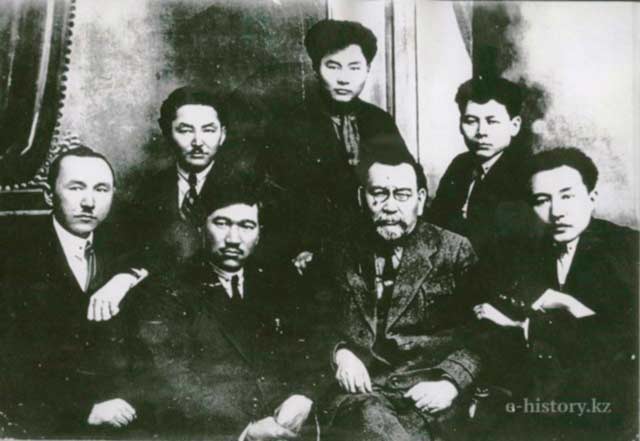
Members of the party “Alash”: first fow: H. Gabbasov, M. Dulatov, A. Baytursynov, M. Auezov; second row: Zh.Aymautov, A. Margulan and A. Baytasov
Zh. Aymautov fruitfully worked «in the small genre of» prose. Besides the well-known story «Guilt Kunekey», his other works «Is this life», «Shepherd Tastamak», «Report Zhidebaya» and others were presented to wider audience.
Translation is another talent of the writer. The brilliant translations in the Kazak language of A. Pushkin’s, L. Tolstoy’s, M. Gorky’s, Maupassant’s, Shakespeare’s, Hugo’s, R. Tagore’s, etc. works shows the bright evidence of language bilingualism of Zh. Aymautov, who perfectly knew Russian language. Aymatov was the one who laid the scientific foundation of a literary translation in the Kazakh literature — the article «About the Translation» («Audarma turaly») was written in 1925.
Zhusupbek Aymautov was the editor of the magazine «Abay» which since 1918 began to be published in Semey. Together with Mukhtar Auezov he published this magazine, print in his the articles and stories. It was not accident that the classic of the Kazakh literature Mukhtar Auezov called Aymautov as his teacher.
Along with literary activities, he was engaged in pedagogics and psychology. In 1919–1920 he taught on pedagogical courses in Semey. He was elected the delegate of constituent congress of Councils of Kazakhstan, the member of Presidium of Central Executive Committee and Narkompros’s board of the republic, the member of an editorial board in case of the State publishing house, worked as the ««Kazakh tili» («Kazakh language») newspaper’s editor.
In subsequent he worked as the manager of elementary school in Karkaralinsk, then in Orenburg and Tashkent. Since 1926, he worked as the director of a Pedagogical College of Chimkent.
In a pedagogical field he reached big heights. He was the author several textbooks and methodical manuals for teachers of schools and pedagogical educational institutions — "Didactics", "A manual on education", "An end-to-end system of guiding of lessons", scientific works: "Psychology" and "Psychology and choice of profession". He was the author of verses "Anthem", "A soldier’s Marseillaise", poems "Song to light", transferred to Kazakh language "International" and "Young Guard". He contributed to the poetry a lot of the new: use of a free verse, non-traditional for the Kazakh poetry, non-compliance with an external rhyme when saving internal rhythmic, etc.
Zhusupbek Aymautov — one of founders of the Kazakh pedagogics and psychology. He is the author of more than ten books, hundreds of scientific publications, textbooks and manuals on pedagogics, psychology and ethics.
Creative achievement of the writer is the novel "Kartkozha" written at the level of samples of the European prose. The author is interested in an inner world and character of the hero, person from the people. The novel "Kartkozha" is revelation of national prose, is constructed on real historical events.
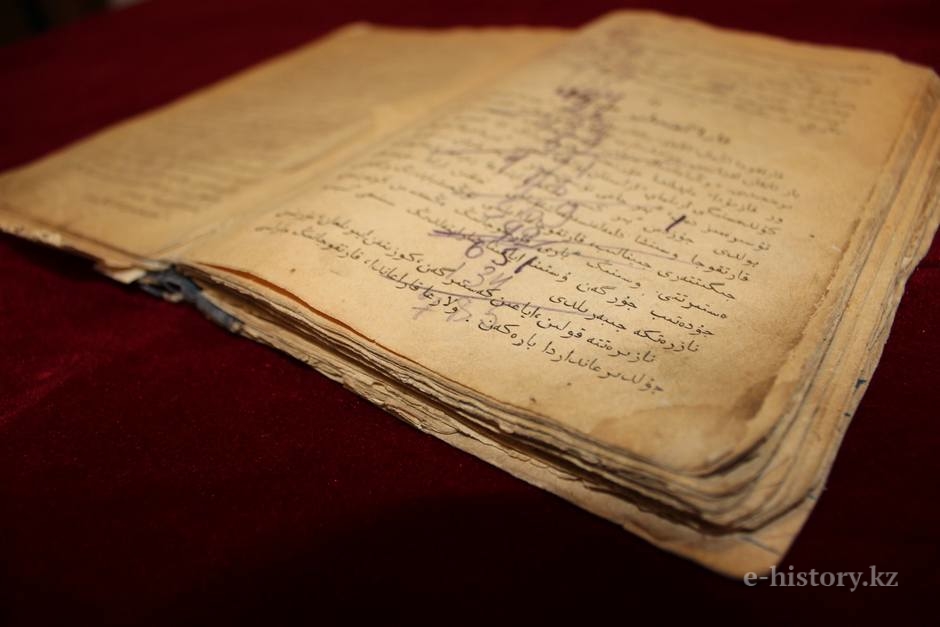
The remained copy of "Kartkozhy" of that time, 1926
Prototype of the main character of the novel is one of outstanding figures of the time and the people, the companion and the colleague of Aymautov — Kartkozha Toganbayev. Toganbayev was born in 1896 in the territory of the Bayanaulsky region.
The primary education he received at the village mullah. He was sharp minded pupil among others. After mobilization of rear works, Toganbayev returned as the different person — full of plans and desires to study. In 1927, he graduated worker’s faculty in Omsk, then in 1931 — Tomsk Technological Institute.
Kartkozha Toganbayev — the highly educated person, knew the Russian, Latin, Arab, Tatar languages and could masterly draw. He worked as the journalist, teacher and was the brilliant translator.
The hero of the novel "Kartkozha" — a generalized character of the intellectual who made himself: the native of poor people, this person gradually begins to see clearly, directs to knowledge and thanks to education becomes among the heroes of a new era. At the same time, tragic time in which lived and against which foundations Kartkozha fought, is described by Aymautov with all reliability: it was both class antagonism and a difficult life of the poor in the Kazakh auls (villages), and the cruel decree of the imperial government on mobilization.
Aymautov stands at the origins of the Kazakh dramatic art, he — the organizer of the first theatrical groups, the production director of the plays on the Kazakh scene.
His plays "Defender of the People", "Careerists", 'Sherniyaz" and "Rabiga" testify his unique dramaturgic talent.
One of its outstanding drama works "Sherniyaz' (1925–1926) devoted to Sultanmakhmut Toraygyrov’s memory, it touches on an issue of relation of the city and village. The play was published in Semey and was put on scenes of theaters. Its principal feature was that it was written by verses alternately with a blank verse. In department of rare manuscripts in Central scientific library of the Kazakhstan’s Academy of Science there were Aymautov’s letters written by him in 1927–1927. In one of them he wrote: "Last year when competition on the best play was announced, I wrote the play "Sherniyaz" and participated in competition. The first place was adjudged to the play. But I refused a prize in favor of the play "Karakoz" of Mukhtar Auezov which took the second place because he studies in the distance and money is more necessary to him than me".
Zhusupbek Aymautov was repressed almost the first from among representatives of the advanced Kazakh intellectuals.
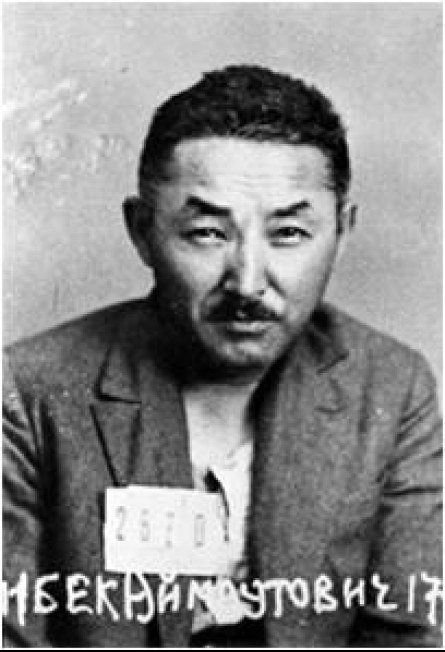
Investigation lasted the whole year, and thus there was no proof in the brought charges. Despite to it, without trial, the decision on execution of the writer was made in absentia. His life broke while the real talent of the artist, apparently, only revealed, finding a steady support in rich life experience — he was only 41. But even such early death at the peak of a creative power, a severe era in which Aymautov lived and created, did not prevent it to show the multi faced personality and become the pioneer in many aspects of cultural and scientific life of the Kazakh society.
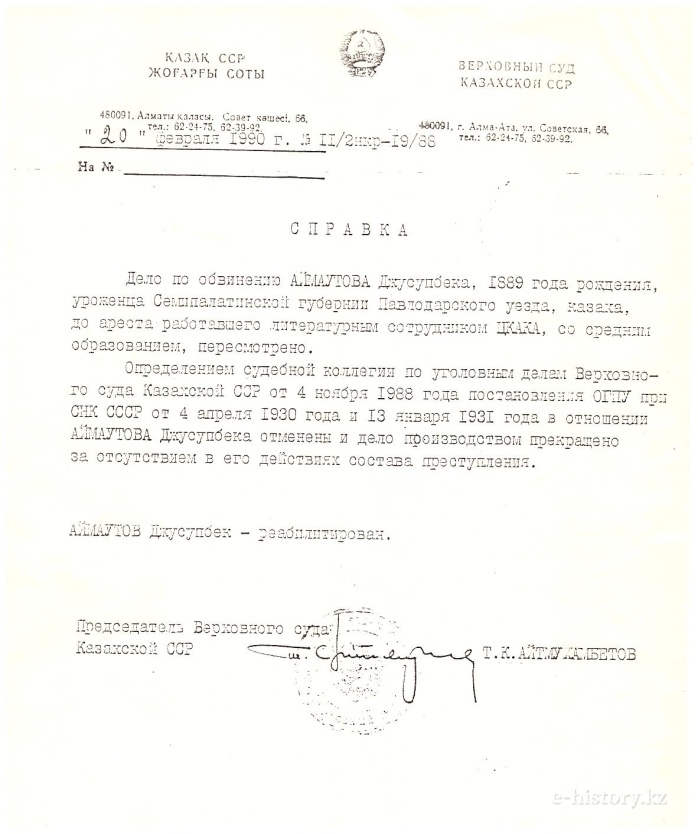
Certificate about Zh. Aymautov's rehabilitation, 1990
DEMCHENKO Alena
Material was prepared together with museum named after Bukhar Zhyrau
